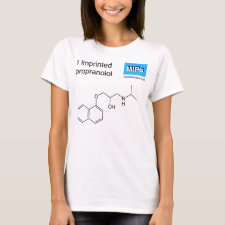
Authors: Pérez-Moral N, Mayes AG
Article Title: Molecularly Imprinted Multi-Layer Core-Shell Nanoparticles - A Surface Grafting Approach.
Publication date: 2007
Journal: Macromolecular Rapid Communications
Volume: 28
Issue: (22)
Page numbers: 2170-2175.
DOI: 10.1002/marc.200700532
Abstract: Surface initiated living-radical polymerization (SIP) based on dithiocarbamate iniferters has been used to create molecularly imprinted core-shell (CS) nanoparticles. Using this approach, propranolol, morphine and naproxen have been successfully imprinted in particle shells (the latter could not be imprinted using conventional aqueous-based CS methods). Rebinding properties of the imprinted particles appear to be similar to those made by alternative methods. The living radical initiation mechanism makes it possible to build complex multi-layer particles sequentially. As a demonstration, multi-layer propranolol-imprinted particles were generated. Two additional functional shells were grown over the imprinted shell, while the propranolol binding was retained, albeit at a reduced level
Template and target information: propranolol
Author keywords: core-shell polymers, dithiocarbamate, molecular imprinting, multi-layer, surface initiated polymerization
![]()


Join the Society for Molecular Imprinting

New items RSS feed
Sign-up for e-mail updates:
Choose between receiving an occasional newsletter or more frequent e-mail alerts.
Click here to go to the sign-up page.
Is your name elemental or peptidic? Enter your name and find out by clicking either of the buttons below!
Other products you may like:
 MIPdatabase
MIPdatabase









